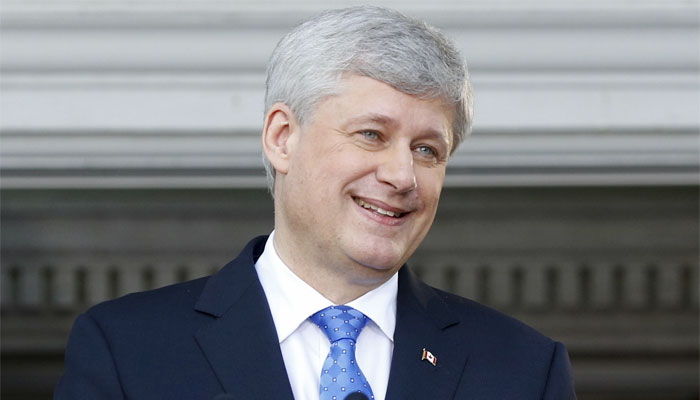Canada's PM Harper takes part in a news conference at Rideau Hall after asking GG Johnston to dissolve Parliament, beginning the longest federal election campaign in recent history, in Ottawa. Reuters
AFP/Ottawa
Canadian Prime Minister Stephen Harper on Sunday called general elections for October 19, kicking off a campaign for a fourth straight term in power amid a sluggish economy.
Harper, in power since 2006, dissolved parliament after meeting with Governor General David Johnston, the representative of Queen Elizabeth II, Canada's nominal head of state in this Commonwealth country.
Voters will be choosing all 338 members of the House of Commons, 30 more than in the last election because of redistricting.
Harper said the election was about "leadership on the big issues that affect us all, our economy and our nation's security."
"It's an election about who will protect our economy in instability and ensure Canada's future prosperity. The national election is not a popularity contest," he added.
The economy is expected to be declared officially in recession in September when second quarter GDP figures are released. But Central Bank Governor Stephen Poloz already said this month the economy was in fact in recession.
Harper had planned to present himself as one of the first G7 leaders to post a balanced budget since the global financial crisis, bolstering his image as a strong fiscal manager.
But that was dinged by massive job losses and lower royalties due to a drop in oil prices over the past year, and growing uncertainty about Canada's economic future.
Boosting national security is also likely to factor into campaigns, after attacks on Canadian soil last October.
The incidents -- in one case a gunman shot dead a ceremonial guard and stormed parliament, and in another two soldiers were run over in rural Quebec, one fatally -- provided Harper with an opportunity to show his mettle on security.
But instead he has reaped scorn for dramatically expanding the powers and reach of Canada's spy agency in the biggest overhaul of the nation's anti-terrorism legislation since 2001.
"This election is also about security," he said.
He added that Canada must confront "the violent global jihadist movement that possesses a direct threat to our friends, allies and to us here at home."
Harper is taking on Thomas Mulcair of the left-leaning New Democrats and Justin Trudeau, leader of the Liberal party and son of Pierre Trudeau, who ruled as prime minister for 15 years.
Trudeau will try to lead the Liberals back into power for the first time since ceding power to the Conservatives in 2006.
In the latest polls Harper's Conservatives and the New Democrats are neck and neck at about 32 percent of voter intention, with the Liberals at 25 percent.
The Green Party and the Bloc Quebecois are also in the race.
The 79-day campaign will be one of the longest in Canadian history.

